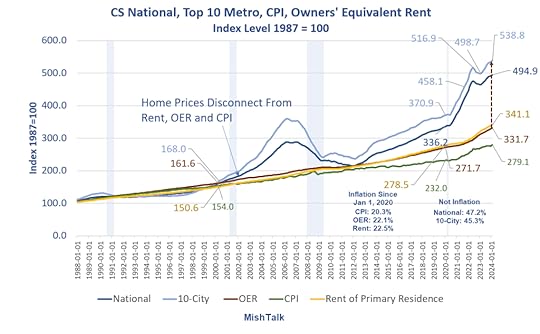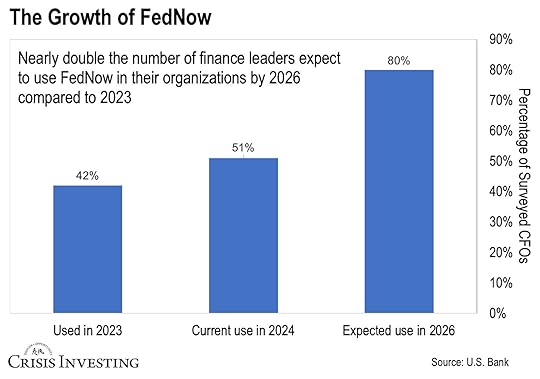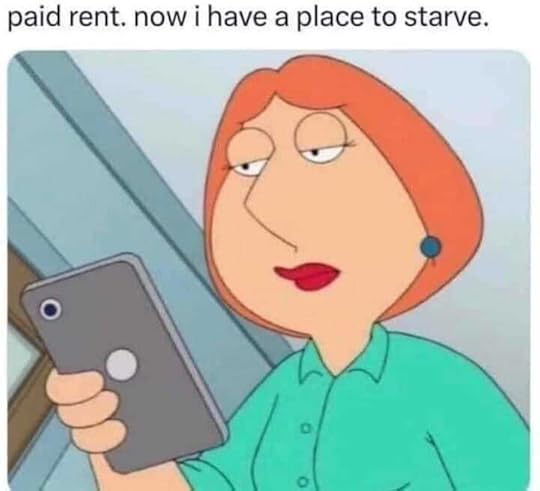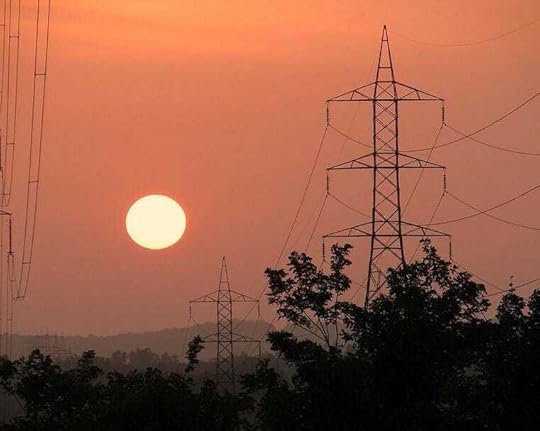Steve Bull's Blog, page 41
May 5, 2024
Money Is a Monopoly Government Will Never Surrender
It was the kind of claim that, at some point in one’s life, causes the jaw to hit the floor. Investigating this assertion more, I came to see that there was a large literature on the topic. Historically, money originated in the market economy itself, a naturally evolving institution that met the needs of trade. Whatever good was generally valued by everyone, and was as capable of being divided into consistent units with a stable value, could be deployed as money, with no need for government to do anything but watch.
But of course history has not panned out that way. Every government has a strong incentive to monopolize the good called money because this is how they can tax their citizens, reward the most compliant industries, cultivate close relationships with bankers, and inflate the currency at will through a variety of methods depending on the technology of the time.
We can of course imagine primitive tribes or pre-colonial native populations using rocks and shells, but is there a modern case where private coinage became normalized? In a major but often overlooked work of historical scholarship, economist George Selgin has written the most extensive treatment of the private coinage industry in the UK at the dawn of the Industrial Revolution.
…click on the above link to read the rest of the article…
Home Prices Hit New Record High, Don’t Worry, It’s Not Inflation
The Case-Shiller national home price index hit a new high in February. That’s the latest data. Economists don’t count this as inflation.
 Case-Shiller national and 10-city indexes via St. Louis Fed, OER, CPI, and Rent from the BLS
Case-Shiller national and 10-city indexes via St. Louis Fed, OER, CPI, and Rent from the BLSChart Notes
National and 10-City Case-Shiller home prices hit new record highs in FebruaryOER, CPI, and Rent are indexes measured by the Bureau of Labor Statistics (BLS).OER stands for Owners’ Equivalent Rent. It’s the price one would pay to rent one’s own house unfurnished and without utilities.Case-Shiller measures repeat sales of the same home over time and the indexes attempt to weed out major home improvements.
Case-Shiller is a far better measure of home prices than median or average prices which do not factor in the number of rooms, location, lot size, or amenities.
Not Inflation?!
Economists, including the Fed, consider homes a capital expense, not a consumer expense.
As a result, they all ignore economic bubbles and blatantly obvious inflation on grounds it’s not consumer inflation. This has gotten the Fed into trouble at least three times. The first was the dot-com bubble, then the Great Recession housing bubble and now.
It’s really pathetic when you make the same major mistake over and over and over. It’s a result of group think.
They all believe in the same silly models based on disproved theories including inflation expectations and the Phillips curve. You do not get in the good ole boys Fed club unless you think like a good ole boy.
Inflation Expectations
Fed Chair Jerome Powell mentions inflation expectations at every meeting. So did former Chairs Janet Yellen and Ben Bernanke.
In my post How Do Inflation Expectations Impact Wages and Future Consumer Inflation? I explain why inflation expectations are irrelevant to future inflation.
Moreover, two Fed studies agree.
…click on the above link to read the rest of the article…
What Exactly is Peak Oil?
 PHOTO: Paul M. Walsh/AP/SHUTTERSTOCK
PHOTO: Paul M. Walsh/AP/SHUTTERSTOCKI could go on and on about acceptance for probably weeks if not months, but today’s article isn’t about acceptance. Today’s article is about energy and resource decline, one of the symptom predicaments of ecological overshoot and what is commonly referred to as Peak Oil. I have mentioned both energy and resource decline and peak oil many, many times in this blog but have never written an article specifically to address exactly what it is. I came across a publication from Stuart McMillen that makes the topic of Peak Oil easy to understand since it is in comic form. This provides a better explanation than a long-winded blog post because it equates peak oil with something fun – a roller coaster!
Maybe I should try more analogies that include fun things to describe and/or explain overshoot. The roller coaster actually isn’t too bad a description. My office manager calls overshoot by the name trebuchet. She described the action or motion of the sling as that of overshoot, taking the name quite literally. She also uses the term derogatorily when I bring up the subject of overshoot, saying, “We’re not going to talk about trebuchets…” From my perspective, there is absolutely nothing wrong with discussing overshoot or any of its symptom predicaments such as peak oil or climate change. In fact, I robustly encourage discussion of the predicaments we face. How else is the general public supposed to understand what is actually happening? Attempting to avoid discussing it won’t make it go away or reduce the consequences, so there is absolutely no benefit in not talking about it. I’m rather passionate regarding talking about it, precisely because I think the conversations are very worth having and because I’d like more people to understand the situation more completely.
…click on the above link to read the rest of the article…
The Fed Is Preparing to End Money as We Know It
Big Banks, FedNow, and the Road to Fedcoin
Every quarter, U.S. Bancorp (USB) releases something called U.S. Bank CFO Insights Report. It gathers insights from over 2,000 senior finance officers (CFOs) nationwide. It might not be everyone’s go-to read, but it’s a good way to stay abreast of what’s happening in the banking industry.
Just a few days ago, they dropped the latest issue, and something immediately grabbed my attention — the survey findings on FedNow, the Federal Reserve’s new real-time payments service.
The report showed that 42% of surveyed CFOs had tried out FedNow in 2023. Right now, 51% are using it, and notably, a staggering 80% plan to use it by 2026.
In other words, nearly double the number of finance leaders anticipate using FedNow in their organizations by 2026 as they did in 2023.
 Clearly, an all-digital dollar is on the horizon, courtesy of the Federal Reserve and big banks.
Clearly, an all-digital dollar is on the horizon, courtesy of the Federal Reserve and big banks.I’m talking about a currency that wouldn’t be printed but would only exist in cyberspace… but one that would also give the Fed and government almost unbreakable financial control over your life.
Now, FedNow isn’t a central bank digital currency (CBDC). But it’s definitely a precursor to one.
Let’s backtrack a bit to understand why.
The FedPalYou see, the Fed and big banks have been gearing up for the eventual rollout of a digital dollar for quite some time now.
As far back as 2017, a consortium including finance giants like Citigroup and JPMorgan initiated a real-time payments network operated by The Clearing House, known as the RTP Network.
This network processed a total of 173 million transactions worth about $76 billion during 2022.
The idea behind the RTP Network has always been to lay the technical groundwork and foster a culture of acceptance for a digital currency. The big banks made no secret of it.
…click on the above link to read the rest of the article…
May 3, 2024
More Evidence Screams “The Books Are Cooked!”
You just can’t make stuff like this up … except the government does … over and over!
 Photo by Ahmed Zayan on Unsplash
Photo by Ahmed Zayan on UnsplashOn April 20th, I wrote about how CNBC had reported that something looked rather rigged about the government’s new jobless-claims data in this election year:
What a Wonderful World!·
APR 20
“Something strange” (REALLY STRANGE) “has been happening with jobless numbers lately” says the CNBC headline. You know it is strange anytime the mainstream media starts agreeing with my longtime criticism of government reports, even using my blunt language—that “the books look cooked.” In fact, the Bidenomics unemployment claims reports don’t just look
Read full storyIndeed, it was strange at the level of just about statistically impossible:
CNBC just noted that five out of the last six jobless reports gave an identical reading of 212,000 new claims and quoted someone observing that the odds against that exact number happening over and over are astronomical.
As CNBC reported, none of the raw numbers for all of those reports were even close to matching each other, but somehow the government’s “seasonal adjustments” always brought the derived numbers to the same 212K. Imagine that! One would almost think, I commented, they were goal-seeking the headline numbers in order to hit the sweet spot for this election year so that the labor market would look neither too hot for inflation nor two cold for the economy. One would almost think.
Well, they did it again. So, think again. Only this time, having been called out with suspicion by one of their usual parrot-press operations that normally takes all government data as gospel truth, they must have decided they needed to tweak the outcome just a bit. So, today, they reported 208,000 new jobless claims.
…click on the above link to read the rest of the article…
Art of the Collapse, May 2024
Let’s play “match the satire to the atrocity”
There are so many wars (and related civil unrest) these days, that it’s hard to keep track of which meme/satire/diatribe is aimed at which crisis.
But April included April Fools’ Day, so at least we have a logical place to start:
CNN Publishes Real News Story For April Fools’ Day(Babylon Bee) – Fooling thousands of readers in a prank that the cable news organization said was “just for fun,” CNN published a real news story for April Fools’ Day this year.
The story simply contained a list of facts, with no embellishment, editorializing, or invented details. The story also didn’t cite shaky “anonymous sources” and only quoted firsthand witnesses to the event. It was completely factual without any errors whatsoever.
Baffled CNN fans immediately knew something was up.
“I was reading this story, and I was like, ‘Wait, what is this?'” said one man in New York who relies on CNN for his fake news every morning. “They really got me good. Then I looked up at the calendar and I realized I’d been duped. A classic gag!”
And Scotland passed a hilariously draconian censorship law, which resulted in the police being swamped by prank complaints and the First Minister resigning.

Meanwhile, “squatters” became a thing:
As for the rest, I’ll just toss them out and you can play “match the satire to the atrocity”:
 …click on the above link to read the rest of the article…
…click on the above link to read the rest of the article…
The Cold Hard Truth About Renewable Energy Adoption
The future of the global energy sector is caught up in a messy and misleading ideological debate. Depending on which politically informed echo chamber one inevitably finds themself confined to on social media, they are either told that the energy transition is a dangerous myth that will end in economic disaster and permanent rolling blackouts, or that clean energy is going to save the world overnight – as soon as conservatives get out of the way. As usual, the truth lies somewhere in between.
The energy transition is strictly necessary. But it’s going to be very, very hard. It’s damaging to deny that there will almost certainly be shocks, missteps, and setbacks as we undergo one of the most disruptive chapters in industrial history. In large part we’re relying on untested and in many cases as-yet unproven technologies to emerge in the nick of time.
There’s a temptation to sugar-coat the scale of the imperative to make the energy transition more palatable and less daunting. But there’s no denying it – it’s a very uncomfortable, and even frightening, petition to be in. And there will be winners and losers as economic priorities shift – the energy transition is good for humanity as a whole, but it certainly isn’t good for everyone. Acknowledging these difficult truths is essential to properly planning for and managing humanity’s greatest cooperative project.
…click on the above link to read the rest of the article…
The Politics of Food | Chris Smaje
What’s the future of food?
Last year, two of my former podcast guests had a long and very public disagreement about the politics of food, locking horns over the utility of farming in a densely-populated world. Activist and writer George Monbiot has written extensively about lab-grown food and the need to revolutionise our food systems with technology so that we can better feed everyone. Farmer and academic Chris Smaje has argued that farming is a critical component of community autonomy, and wrote a book in response to George’s own, Regenesis, criticising the vision as “eco-modernist”. George hit back that Chris’ proposal is a “cruel fantasy”.
I watched this unfold online, worried to see two experts disagree so deeply on something fundamental to how we organise society, and invited Chris back to talk about this second book, Saying No To A Farm-Free Future. Chris explains how our food production systems are emblematic of our crisis of relationship to the earth. He argues that de-materialising our food supply plays into the colonial history of uprooting people from the land and denigrating agriculture. This leads us to discuss land, language, and culture, decentralising power, and the political binaries that could be dissolved by grounding our thinking in the land.
Correction: The previous version of this interview stated that the debate between George Monbiot and Chris Smaje was around lab grown meat instead of lab grown food.
…click on the above link to listen to the interview…
Exclusive: Every right-wing party in Europe needs to prepare for mass censorship, warns Flemish MEP Gerolf Annemans
In an exclusive interview with Remix News, Gerolf Annemans, the Vlaams Belang MEP and president of the European Identity and Democracy group, warns that even greater censorship of conservatives is just around the corner, and tells right-wing groups what they must do to ensure their message continues to be heard

Conservative political parties across Europe should begin contingency planning for the inevitable time in the near future when right-wing platforms are the victims of mass censorship by an increasingly desperate liberal establishment, a senior Belgian nationalist lawmaker told Remix News at the Conservative Political Action Conference (CPAC) in Hungary last week
The right may be forced off social mediaConservatives are also being targeted offlineHow does Vlaams Belang move forward?“Globally, we expect that we have to seek alternatives. That’s why we now organize visiting homes on a very large scale. We are shifting toward means that give us the opportunity to reach the electorate even if we are cut off on social media,” said Vlaams Belang MEP Gerolf Annemans.
“We have new means to talk to the people. People want to hear us. So, the people are open to hear and to listen to us and we adapt to the situation. We expect social media to be shut down for normal political communication,” the MEP warned.
Vlaams Belang is a Flemish nationalist party that proposes independence for the region of Flanders from the rest of Belgium. It has had considerable success on social media in recent years, particularly on Facebook where it has amassed 620,000 followers, helping the party push its core messages and propel itself to the top of the polls in the region….
…click on the above link to read the rest of the article…
Discovering Power’s Traps: a primer for electricity users

In magazines like Mother Jones and Sierra Club, environmentalists who aim to reduce harmful impacts to public health, wildlife habitats and climate systems propose “electrifying everything.”
I don’t get it.
Already, most of our food, shelter, communications and transportation systems depend on electricity. Replacing vehicles, stoves, heaters, water heaters and money (mining bitcoin) with electric ones would require massive expansion of the power grid. We’d have to manufacture lots of new appliances and vehicles (and discard old ones). We’d have to manufacture and operate more substations, generators, transformers, power lines, appliances, circuit boards and batteries. Their manufacturing would require more fossil fuels, more rare earth elements, more water, more smelting and refining, more hazardous chemicals and more international shipping. It would generate more toxic waste and more electromagnetic radiation.
So would adding artificial intelligence (AI), solar PV, wind and battery systems to our technosphere. Electrifying everything would also require expanding telecommunications: more satellites, cell sites, data storage centers and computers.
Given power outages’ increasing frequency, increasing our dependence on electricity now…makes no sense.
What are our goals again?
To reduce harms to nature: to reduce harms to public health, wildlife habitats and climate systems. To keep power reliable and safe.
Electrifying everything cannot accomplish these goals.
To reduce harms to nature, we need to manufacture less, consume less and significantly limit new infrastructure. We need liability-carrying subject-matter experts to evaluate every product’s ecological impacts from cradle-to-grave.
To keep power reliable and safe, we need engineers in charge of the grid.
To reduce demands
I understand that using fossil fuels increases global temperatures and severe weather conditions. Electricity, usually powered by natural gas or coal, accounts for roughly 20% of global energy consumption. Transportation (of people and goods), run largely on petroleum, accounts roughly for 25%.
…click on the above link to read the rest of the article…



